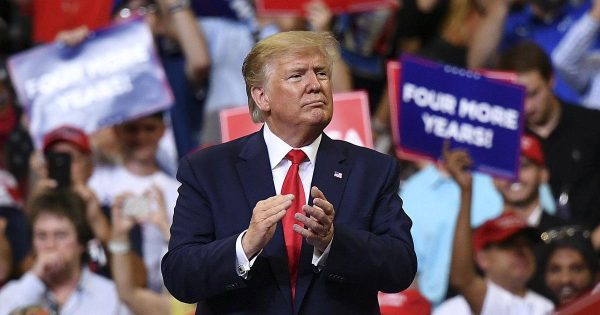
After securing 312 electoral college votes and the popular vote, Republican candidate Donald Trump, America’s former 45th president and now projected 47th president, will be sworn into office on January 20th. The 2024 election caused a mass stir nationwide as people anxiously anticipated the results. Social media saw several expressed emotions from users of all backgrounds, and first-time voters rushed to submit their ballots.
Historic is one word to describe this past election; with over 158 million ballots cast, the nation witnessed a noticeably high voter turnout. Furthermore, President-elect Trump is the second president in American political history to secure a second non-consecutive term, with the first president being Grover Cleveland (22nd and 24th U.S. president). Victories in several key states such as North Carolina, Georgia, and Pennsylvania proved instrumental in his overall success; additionally, the red sweep includes improved engagement with Hispanic, Black, and suburban female voters, demographics that traditionally lean Democratic.
President Biden responded to President-elect Trump’s win by congratulating him and emphasizing a peaceful transfer of power. Vice President Harris reaffirmed this notion in her concession speech, formally addressing the loss while stating that “the light of America’s promise will always burn bright … as long as we keep fighting.”
This year, many students voted for the first time. Voting is an essential right given to US citizens, and it’s important to make a proud and informed decision to promote the country’s democracy. Katie Ruoo (12), a Yorba Linda High School student, shares, “Being able to vote for the first time was such an exciting experience! I’m glad I was able to contribute my vote to such a pivotal moment in history.”
While people may believe their one vote cannot make much difference, Faith Alam (12), another YLHS student, testifies that everyone’s voice matters: “It felt really good to be able to make my voice truly heard for the first time through voting. I feel like it’s important since it’s a popular way people can help influence the election results and politics in general.”
Citizens can vote at local, state, and national levels by casting ballots at a polling station, by mail, or by early voting. The United States is built on the foundations of democracy, and the voting process empowers citizens to influence how they are governed by selecting future leaders and policies.
The World’s Response
The election’s results have garnered mixed messages across the nation and even the world. Countries such as India, Africa, and Mexico have little concern for President-elect Trump’s second term as president and have hope in his economic policies. However, Asian countries are likely to have an increase in financial burden. China may face higher tariffs, and Japan and South Korea “expect to be pressured into paying more to have American troops based in their countries” (NYT).
Trump has also claimed he will end the war in Ukraine “in 24 hours” but has not explicitly stated how. However, his past support for Russia and criticism of the amount of aid given to Ukraine may signify the upcoming end of US assistance. This would leave Ukraine without their greatest backing, ease relations with Russia, and relieve the US of some military expenditures (CNN).
For America itself, President-elect Trump’s presidency could potentially lead to one of the largest mass deportations of immigrants living illegally in the country, implementations from Project 2025– an agenda posed by conservatives for the future of the US– and enacting tariffs on nearly all American imports (Washington Post).
As America moves into this new presidential term, there is still uncertainty regarding the future and how things might turn out. Although there are many expectations surrounding the policies Mr. Trump may implement, there are limits to his power and what he can accomplish.
Trump’s Economic Policies
One of the main swaying reasons for choosing either candidate was people’s perceptions of their economic policies. President-elect Trump has floated many possible tax policies: extending tax cuts from the 2017 Tax Cuts and Jobs Act (TJCA), deducting state and local taxes (SALT), and imposing new tariffs (Tax Foundation).
Even though the boost in inflation following the 2020 recession has since decreased, Americans are still frustrated over high prices, which contributed immensely to voters’ decision to vote for Trump. Many individuals now anticipate that “Trump can restore the low prices and economic stability they recall from his first term…” (AP News).
President-elect Trump has already begun assembling the administration for his second term:
Department of Government Efficiency: Elon Musk and Vivek Ramaswamy
Secretary of Defense: Fox News Commentator and National Army Guard Officer Pete Hesgeth
Secretary of State: U.S. Senator Marco Rubio
Security of Homeland Security: South Dakota Governor Kristi Noem
Administrator of the Environmental Protection Agency (EPA): Former New York Congressman Lee Zeldin
U.S. Ambassador to the United Nations: New York Congresswoman Elise Stefanik
National Security Advisor: Florida Representative Michael Waltz
White House Chief of Staff: Susie Wiles, a longtime political operative and co-chair of Trump’s 2024 campaign
Deputy Chief of Staff for Policy: Stephen Miller, who previously served as a senior advisor in Trump’s first administration
“Border Czar”: Former Acting ICE Director Tom Homan
Director of the Central Intelligence Agency (CIA): Former Director of National Intelligence John Ratcliffe
U.S. Ambassador to Israel: Former Arkansas Governor Mike Huckabee





























Brenda • Dec 5, 2024 at 7:30 AM
This was such an informative article. I loved learning the details of what happened in this recent election!
Eric • Dec 5, 2024 at 7:24 AM
This is such an enlightening article featuring first-time voters’ voices in this historic election.